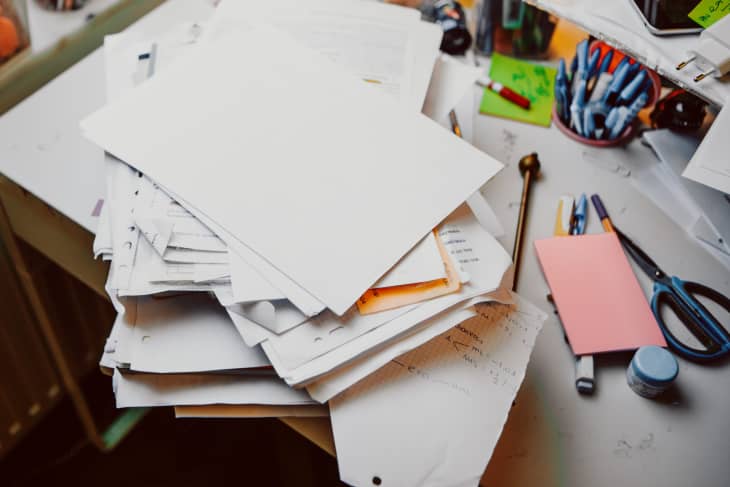5 Productivity Tips (That Work) from Formerly Disorganized People

Pop quiz time. What’s in your top desk drawer? What’s on your calendar for tomorrow? Do you have all your documents in order in case you get audited? How many scented candles do you have sprinkled around your apartment?
If those questions prompt a wave of anxiety, you probably fall into the vast majority of people who consider themselves slightly — or majorly — disorganized. And disorganization can impact everything from missing important phone calls to buying too many spices because you didn’t know what you had in your cabinet. It can waste time, money, energy, and zap your productivity.
Luckily, five formerly disorganized people have shared their tips for getting organized and making more time for productivity and free time. From prioritization to paring down to giving yourself permission not to worry about the small things, these are the tips to work into your daily and weekly routine.
“If you have more than you need you will never be organized.”
“A person’s environment is a reflection of their inner mind, and, in general, disorganization is a symptom of an overwhelmed mind,” says Marley Errico, Director of Operations at Baia Agency. She believes the first step to embracing organization and structure is letting go of things that don’t serve you and clearing the way for organization and productivity.
Errico says, “If you have more than you need you will never be organized. This applies to physical stuff, but also intangibles like your schedule.” Just as an overcrowded desk will distract you from getting quality work done, so will a day overbooked with unnecessary meetings. When you pare down your day to just the essentials, there’s less to keep track of, and less to distract you from your goals.
“Follow the urgent-important principle.”
“When I didn’t have my self-organization under control, my disorganization would more often than not come from starting new tasks or taking on new projects without finishing ongoing ones first,” says Keanen Buckley, a marketer and consultant. “When I wouldn’t get this under control, it would lead to anxiety and a lack of motivation, and my productivity would suffer.”
Now, he intentionally prioritizes everything that comes his way, whether it’s a major project, a quick client task, or a personal to-do. He keeps a running list of what he needs to get done, and recommends using what works best for you, whether that’s a journal, a Notion template, or the Notes feature on your phone (his preference!).
Buckley then defines the urgency and importance of each item. “For me, urgent items are ones I need to act on within 24 hours. Important items are ones that will save me time and headspace in the future,” he explains. Move through the list in this order: urgent-important, then important-non-urgent, followed by urgent-non-important, and, lastly, non-urgent-non-important.
“See it. Say it. Write it. Review it.”
Renee Rosales, M.Ed. and Founder/CEO of Theara, has a rule: “See it. Say it. Write it. Review it.” She says this technique helps her brain process and retain information, rather than having it go in one ear and out the other. Morales explains, “I used to spend a lot of time beating myself up for being easily distracted, disorganized, and forgetful. However, once I became aware of my ADHD, I found ways to work with my nature, instead of against it.”
“The review part is particularly helpful, as it provides an opportunity to reflect and evaluate,” says Rosales. Now, she confidently stays on top of tasks, rather than worrying about what she might be overlooking.
“I created dump zones in each room.”
Brianna Spause, an artist, educator, and entrepreneur, recently created dump zones throughout her house so she can stay focused on the task at hand, without getting distracted by trying to organize and put things away at that very moment. “I try to empty the basket every Friday and put away one to two things a day when I am feeling up to it. I work long hours and it’s not always as easy as bringing things where they need to go!” says Spause.
In her bedroom, the dump zone is a wicker basket tucked out of view; the living room has a coat rack that she uses to hang her wallet, purse, keys, and other items that she might accumulate coming and going; and mail has a specifically designated drawer in a console table. By giving herself the permission to tackle these small tasks later, she has more space for creativity and work.
“An inventory will help you know exactly what’s in storage.”
Think about all the time you spend looking for things. That’s time you could be spending doing work or relaxing. Oana Pricop, owner and editor at Ianiko.com used to be that person. “I realized that being disorganized was costing me a lot of time and money,” says Oana. So, she invested time to get time, and came up with systems that worked for her.
Now, she recommends keeping an inventory of what is in containers and storage bins in your office and around your home. She explains that if you have a storage box filled with chargers, power strips, USB cables, and other electronic items, you could spend wasted time and frustration digging through it, hoping to find the right piece — and that doesn’t even guarantee it’s in there. Instead, label everything with what’s inside. “An inventory will help you know exactly what’s in storage so you can grab what you need and go,” says Oana.